Scotland Independence Results: No Vote Boost Markets but Raises Political Challenges [LIVE]
- Day two of the live blog: read part one here.
- Scotland votes 'No'
- YES: 45%
- NO: 55%
- Scotland's largest city, Glasgow, votes for independence
- David Cameron promises to follow through with Devo Max plans and to devolve more powers to English, Welsh and Northern Irish parliaments
- Stories, views and comments: tweet me @fbermingham
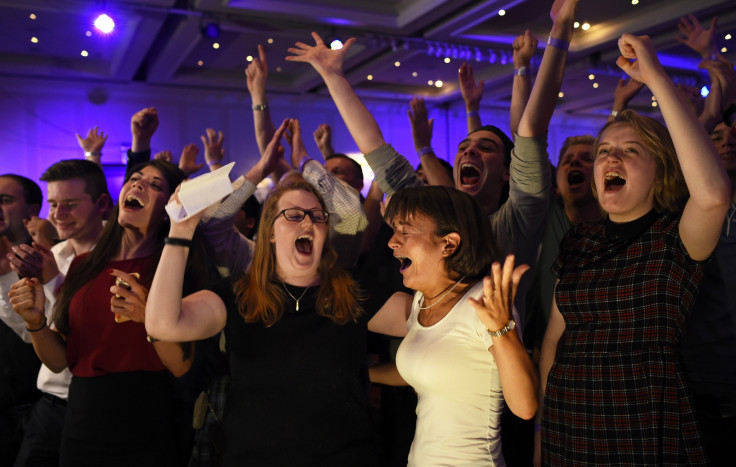
12:13: Before we set fire to this thing and send it down the river, here are a few thoughts on the events of the past two days.
The result may not have been to everybody's liking, but the majority has spoken. What a turnout that was. And while I'll stop short of jumping on board HMS Democracy Was The Real Winner (because I'm sure that would be patronising in the extreme), there's no doubt that the sight of a nation so politically galvanised is inspiring.
Speaking to a South Londoner the other day, I wondered whether the level of political engagement we've seen in Scotland could be tranferred down south? They thought not, saying that the people of Scotland were galvanised by the prospect of "true change"; change of the kind many in England can't imagine under the current political system.
But the Scottish referendum has shown that it is possible for young people to "take an interest" in politics. Politicians just have to present them with an option they're willing to fight for.
What will emerge from the "constitutional revolution" David Cameron is proposing? Will a devolved English parliament conversely lead to a further centralisation of resources and power, or will it offer more room to maneuvre, with the resources to do so, for Scotland, Wales and Northern Ireland? We must wait and see, but the prospect is exciting.
The events of the past two days have the potential to change the political landscape as we know it. We are living in interesting times. It's been quite a ride.
12:00: Right, a couple of quickfire posts before we close up this blog and resume normal business.
From elsewhere on the site:
Tabatha Kinder reports on the rumours of "vote rigging" which are currently doing the rounds:
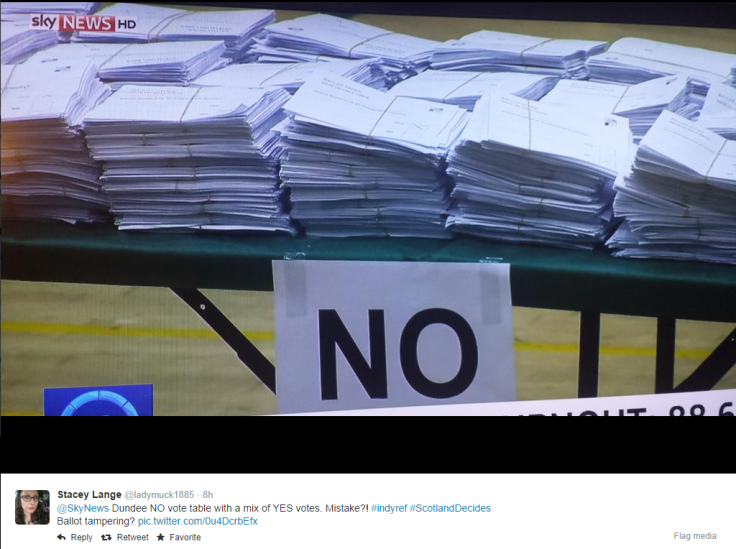
Apparently this picture shows that the whole thing was a fix. Tabatha writes:
Disappointed 'Yes' voters across Scotland are reacting to the news that Scotland has voted No to independence with disbelief, as thousands claim the ballot was rigged in voting stations in locations such as Dundee and Edinburgh.
Stills from a broadcast on Sky News of Dundee polling station have been circulating widely on Twitter and Facebook this morning. The images apparently show a ballot paper clearly marked "Yes" in a pile allocated to No votes.
The image has led to allegations of electoral fraud and rigging in the historic elections, with Facebook users on the popular "Scottish Independence - Vote YES" page claiming the video shows the vote is "definitely a fix".
One Yes campaigner, Amy Louise, wrote: "This entire thing stinks so much of fish, it's attracting sharks from Australia."
But the Yes campaign in Dundee has clarified that the image in question merely shows votes waiting to be counted - not ones that have been counted already.
They tweeted: "To clarify, ballot papers have not yet been sorted in Yes/No and are just resting on table where No will go once sorted. No need to worry."
The tweet has not quashed the fears of many Scots, however, with Twitter users responding to @YesDundee quoting a sketch from Father Ted. A number of users replied: "The money was just resting in my account, honestly your honour."
Elsewhere on IBTimes UK, Foreign Reporter Umberto Bacchi collates the views of world leaders, commenting in the aftermath of the referendum result.
Among them are Nato Secretary General Anders Fogh Rasmussen, who said:
I fully respect the choice that the people of Scotland have made in yesterday's referendum.
"The United Kingdom is a founding member of Nato, and I am confident that the United Kingdom will continue to play a leading role to keep our Alliance strong."
And Spanish Prime Minister Mariano Rajoy, who is facing separatist movements in Catalonia and the Basque country, saying he is "very happy" with the result, writing:
They [the Scots] have chosen between segregation and integration, between isolation and openness, between stability and uncertainty, between security and risk. And they have chosen the best option for everyone: for them, for all Britons and for the whole Europe."
11:45:
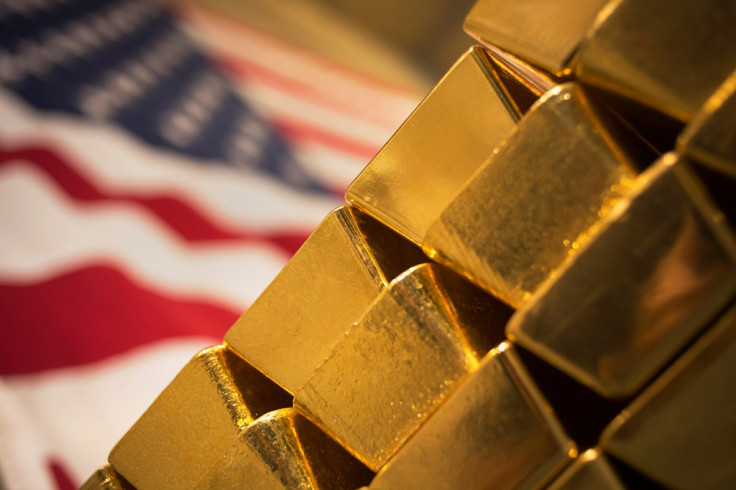
Update on (07:48 - don't bother trawling through the blog, it's the guy who won all the money).
William Hill has published some quotes from the guy who staked £700,000 on a 'No' vote. The lucky punter, who describes himself as an "experienced middle-aged investor", says:
...I am obviously pleased with the final outcome, but not really surprised.. The wager reflected a personal conviction about how the individual campaigns might evolve and what was important to local Scots. Anyone who tried to understand these perspectives would probably have arrived at similar conclusions..."
"...Right now though my thoughts are focused on the future. The answer to one short question on independence for Scotland has raised so many others across the Union as a whole – this is the new challenge..."
"...the nature of the debate and the consequences of the outcome have ignited my own political activism and I hope to pursue those ideals very shortly..."
11:30: "Devolution". You're going to be hearing a lot about that over the coming months. We've gathered a few views as to what it might actually mean in practice, for all members of the union.
In an email to IBTimes UK this morning, Dr Sean Lang, Senior Lecturer in History at Anglia Ruskin University and Chairman of the Better History Forum, wrote:
Federal systems of government have worked well in countries which are made up of former separate states with a strong sense of their own identity. This was the origin of the United States, though it needed a civil war to finalise the integration of the southern states into the Union; it was also the basis for the creation of a united Germany in 1871 and the German federal structure has survived through the many dramatic changes in modern German history, including the country's reunification in 1990. There is a case for saying that a federal structure is the logical outcome of creating devolved governments in Scotland, Wales and Northern Ireland. However, federalism is not the same as devolution: federal states have much more autonomy than devolved assemblies enjoy.
A balance has to be struck between the relative weight of federal states of hugely different size and population: in the United States, all states elect two Senators, but their representation in the House of Representatives is proportional to their population. Even though voters in England have rejected the idea of regional assemblies, a federal union inevitably raises urgent questions about the best shape and administrative structure of England, by far the union's biggest, most populous and wealthiest component state. Since that wealth is disproportionately centred on London, it could even raise questions about the political relationship between the capital and the rest of England, never mind the rest of the United Kingdom. Over and above all of this is the question of relations within the European Union: although foreign policy would normally rest in the hands of the central government, the component states of a federation could well demand more of a say over European negotiations and agreements affecting their own areas of responsibility.
This is therefore an opportunity for potentially exciting and very positive change; however, if it is mishandled it could feed deep-seated resentment which could easily come to the surface, much as some of the more bitter feelings surfaced in the Scottish referendum. Constitutional change demands a calm, reflective and sensitive approach both to national sentiment and to hard-headed political and economic reality. In its last months before the General Election, the coalition government has set itself a formidable challenge.
Adding his voice to the clamour, the Labour MP for Birkenhead Frank Field said:
The promises to Scotland ensure that the English Question will dominate May's general election. Voters will demand from all English candidates whether they support English home rule and if they support giving an additional £1500 a year, for ever, for every person living in Scotland, over and above what they will vote for their own constituents. Voters will demand "yes" to the first question, and "no" to the second. These are the answers I shall willingly give.
11:15: Update from (09:36)
Relax. I'm leaving. #indyref pic.twitter.com/SGHt18pps1
— Piers Morgan (@piersmorgan) September 19, 20141105: City warned not to rest on laurels
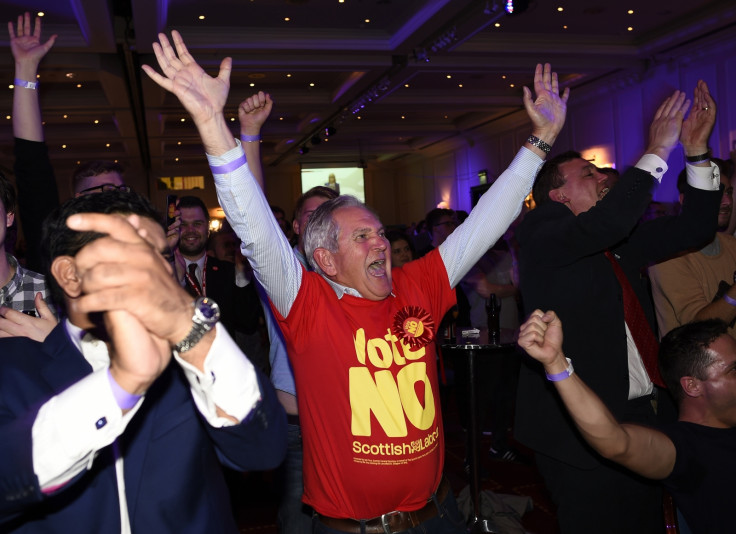
Excellent analysis from Shane Croucher here, in which he warns the financial sector that they're not out of the woods yet. He writes:
But the City should be careful before relief turns to complacency or cockiness. A significant chunk of the Scottish population – over 1.6 million people – voted for independence, a mass of support that has gathered significantly over time. Many of them are young. And they aren't going to become unionists overnight.
Adding:
So markets can celebrate in the short term and start putting the value back into Scotland-exposed stocks that had been trimmed away in the months leading up to the independence referendum.
But they should also be keeping a very close eye on any English backbench discontent in Westminster that could disrupt the devolution of more power to Scotland.
If the various political issues aren't resolved quickly, with Scotland receiving its promised powers, the prospect of yet another independence referendum – this time based on a platform of broken Westminster pledges – becomes very real.
Alex Salmond, the Scottish National Party leader and frontman of the independence movement which got so close to victory, may go away. But the question of independence probably won't.
10:50: The state the obvious award for today is shared between the ratings agencies Fitch and Standard & Poor's, both of which say they will not downgrade or upgrade the UK for managing to hold on to Scotland.
Well done, guys.
Here's what Fitch had to say upon accepting the accolade:
"Scotland's small share of the overall UK economy, and the relatively conservative limits set on Scottish borrowing, mean that the fiscal risks posed by further Scottish devolution are not high in our opinion."
Fighting back the tears, Standard & Poor's said:
The decision by the Scottish electorate yesterday to remain part of the United Kingdom does not affect our 'AAA/A-1+' sovereign credit ratings and stable outlook on the UK.
10:45: There's an excellent data blog over on Reuters, which gives you an overview of how voting patterns changed over the buildup to the referendum, and a complete and thorough breakdown of the results.
Here's a snippet, but be sure to visit the original:
| 41.3% | 58.5% | 4.1% | 81.7% | Labour | 5.0% | 8.2% |
| 39.6% | 60.3% | 4.8% | 87.2% | SNP | 3.2% | 1.7% |
| 43.6% | 56.3% | 2.2% | 85.7% | SNP | 5.8% | 2.1% |
| 41.4% | 58.5% | 1.7% | 88.2% | Indep. | 5.5% | 8.2% |
| 46.2% | 53.8% | 0.9% | 88.6% | Labour/SNP | 9.3% | 21.9% |
| 46.5% | 53.4% | 0.5% | 86.2% | Indep. | 5.9% | 6.7% |
| 34.3% | 65.6% | 2.9% | 87.5% | Conservative | 6.7% | 30.7% |
| 57.3% | 42.6% | 2.8% | 78.8% | SNP | 11.4% | 20.8% |
| 47.2% | 52.7% | 2.3% | 84.5% | SNP | 10.8% | 2.4% |
| 38.8% | 61.1% | 2.0% | 91.0% | Labour/SNP | 4.9% | 2.5% |
| 38.3% | 61.7% | 1.9% | 87.6% | Labour | 6.2% | 5.8% |
| 36.8% | 63.1% | 1.7% | 90.4% | Labour | 5.8% | 9.8% |
| 38.8% | 61.0% | 8.8% | 84.4% | Labour | 6.6% | 0.0% |
| 46.5% | 53.4% | 2.9% | 88.7% | Labour | 7.7% | 9.1% |
| 44.9% | 55.0% | 7.0% | 84.1% | Labour | 8.1% | 12.8% |
| 53.4% | 46.4% | 11.3% | 75.0% | Labour | 9.8% | 41.6% |
| 47.0% | 52.9% | 4.5% | 87.0% | Indep. | 5.0% | 5.8% |
| 49.9% | 50.1% | 1.5% | 87.4% | Labour | 8.2% | 40.0% |
| 43.7% | 56.2% | 1.6% | 86.8% | Labour | 6.9% | 2.7% |
| 42.4% | 57.5% | 1.8% | 85.4% | Labour/SNP | 4.7% | 0.0% |
| 48.9% | 51.0% | 2.7% | 84.4% | SNP | 11.6% | 25.7% |
| 51.0% | 48.9% | 6.3% | 84.4% | Labour | 9.5% | 23.9% |
| 32.8% | 67.1% | 0.4% | 83.7% | Indep. | 3.4% | 0.0% |
| 39.8% | 60.1% | 2.8% | 86.9% | SNP | 5.0% | 3.4% |
| 47.2% | 52.8% | 3.1% | 87.3% | Labour | 8.2% | 22.4% |
| 33.4% | 66.5% | 2.2% | 87.4% | Conservative | 4.0% | 3.8% |
| 36.3% | 63.6% | 0.4% | 84.4% | SNP | 2.9% | 0.0% |
| 42.1% | 57.8% | 2.2% | 86.1% | Conservative | 7.7% | 11.6% |
| 45.3% | 54.6% | 6.1% | 85.3% | Labour | 7.9% | 13.3% |
| 40.2% | 59.7% | 1.6% | 90.1% | SNP | 6.8% | 6.4% |
| 53.9% | 46.0% | 1.7% | 87.9% | Labour/SNP | 10.6% | 26.3% |
| 44.8% | 55.1% | 3.2% | 86.2% | Labour | 7.3% | 6.2% |
*Largest party by council seats
**The local share is the percentage of a local authority's datazones which fall within the 15% most deprived datazones in Scotland.
Sources: Office for National Statistics; local councils; House of Commons Library
10:33:

Sounds like IBTimes UK Business Editor Lianna Brinded is the only person still awake up in Edinburgh.
The streets of Edinburgh are abnormally quiet after an initial burst of sirens and ambulances after pubs closed in line with the referendum results.
Glasgow contacts tell me that many were out at parties and pubs until the results were announced are now expected to laying low until this evening.
09:51:
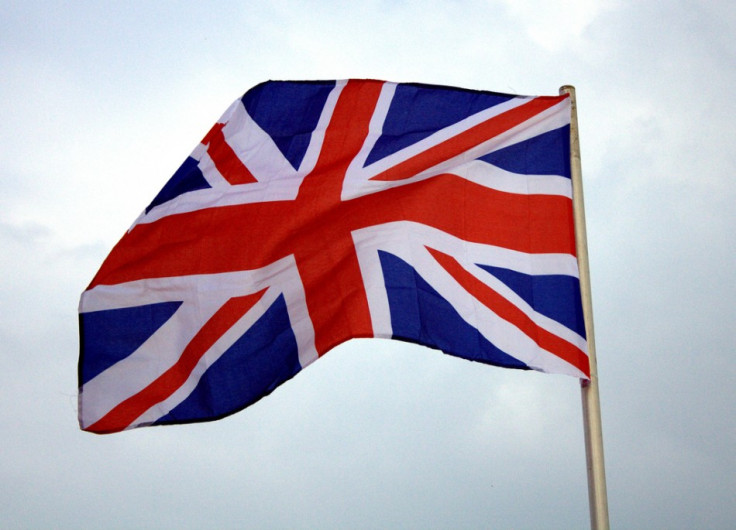
As we begin to deal with the fallout of yesterday's referendum, politicians and officials from each of the four members of the UK have been wading in with their two cents. Increased devolution may be welcomed, but at this stage the details are ambiguous.
The Guardian quotes Martin McGuinness, Sinn Fein deputy-leader and deputy-first minister of Northern Ireland, as saying:
The yes vote, whilst not delivering independence, means for all of us things can never be the same again.
The Guardian's Ireland correspondent Henry McDonald adds:
But behind his upbeat tone there will be disappointment within his party and amongst Irish republicans over the result. At the party's annual conference earlier this year, President Gerry Adams said the vote in Scotland would prove to unionists in Northern Ireland that the union was 'hanging by a thread'.
Grassroots republicans had made their support for Scottish nationalists known. On the iconic wall in the Free Derry corner of that city, republicans replaced the words 'You are now entering Free Derry' with 'You are now entering Free Scotland'. In Belfast, they painted giant yes slogans on the side of Divis Mountain. But as the unionist victory sinks in, those slogans are likely to quietly disappear over the weekend.
Meanwhile, the same paper quotes the leader of Plaid Cymru Leanne Wood as saying:
Wales can no longer be a spectator in its own national journey. The Westminster parties made specific vows during the referendum campaign and in Wales the London parties have suggested a change of pace in terms of decentralising power to the people of Wales. Any offers to Scotland must be offered to Wales too. That's the very minimum we should expect. Wales should not be treated as second class to Scotland.
It's an interesting line from Wood. When I reported from the Nato Summit in Newport, Wales, last month, there seemed to be little agitation for further devolved powers in mainstream circles. As Graham Morgan, the director of the South Wales Chamber of Commerce, told me: "Wales is a net benefactor of the central tax system."
09:40: Miliband throws support behind devolution plans
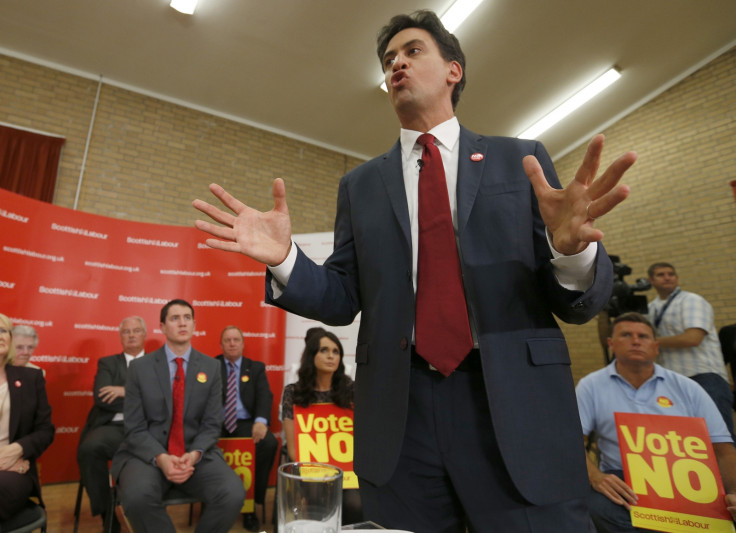
The leader of the Labour Party Ed Miliband has backed plans to devolve powers from Westminster to all four UK nations.
The comments come after the Prime Minister David Cameron promised to deliver on the constitutional reform in Scotland pledged before the referendum.
"Devolution is not just a good idea for Scotland and Wales but it is a good idea for England and indeed for Northern Ireland too," Miliband said.
09:36: The beauty of the internet is that it never forgets. Social media is awash with amateur detectives, caching and filing, logging and bookmarking, meaning that if you promise to do something, you'd best make good on that pledge.
Well, given his 4 million-plus followers and general level of (pantomime?) unpopularity, it was never going to take Jessica Fletcher to unearth this pre-referendum vow from Piers Morgan. Twitter holds its breath, to see whether he's going to keep his word...
Dear People of Scotland, if you vote NO, I promise to go straight back to America. #indyref
— Piers Morgan (@piersmorgan) September 14, 201409:28: Here's a handy list of what went down in Scotland last night.
The full & final #indyref result pic.twitter.com/7ss7bRlbEJ
— Robin Brant (@robindbrant) September 19, 201409:23: Now, I hear you cry. What, pray, does a 'No' vote mean for Scotland's property market?
Thankfully I've been given this statement from the National Association of Estate Agents.
According to Managing Director Mark Hayward:
With the outcome now certain and Scotland voting to remain part of the United Kingdom, we can expect to see some positive movement in the Scottish housing market - good news for Scottish estate agents and their customers who can now look forward to a less frenetic housing discussion and market.
Although the outcome does not necessarily guarantee clarity for the market, the mist of ambiguity will clear much earlier than if the outcome to Scottish independence was 'Yes'. Therefore, there is likely to be a substantial increase in market activity in the coming months, with an increase seen in the volume of sales and investments. This could disrupt house prices in the short-term, although not significantly. The existing concerns around increases in interest rates and a significant hike in stamp duty will undoubtedly have a bigger impact over the next 12 months."
09.11: Is Big 'Eck about to go?
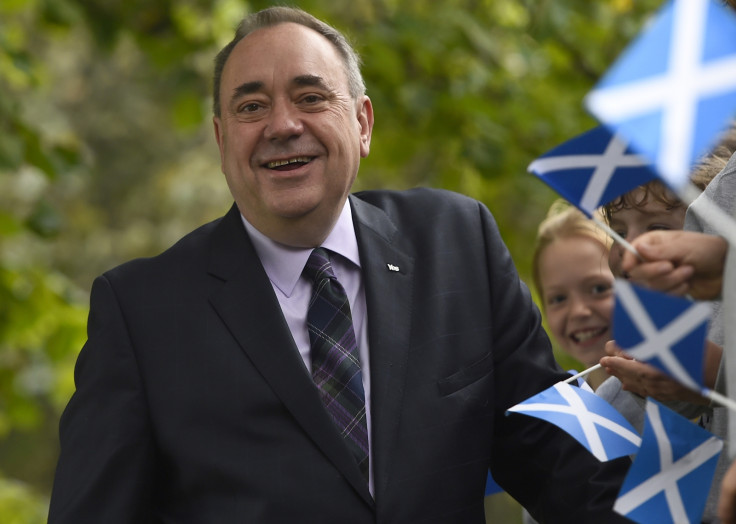
Bookmaker William Hill has made Alex Salmond odds-on to stand down as First Minister before the Scottish Elections take place in 2016. He is 8/15 to have departed by then, but 11/8 to remain in charge to lead the SNP into the Scottish Elections.
08:46: The final poll is in, from Highland
"Scotland's Highlands declare results; YES: 78,069 NO: 87,739 - RadioClydeNews" http://t.co/ADSRwgEPDq
— SavageNation (@SavageNation) September 19, 20142,001,926 voted No, 1,617,989 voted Yes. Final result from #indyref
— Lianna Brinded (@LiannaBrinded) September 19, 2014Final result of Scotland's Independence referendum #indyref
NO 2,001,926 (55%)
YES 1,617,989 (45%)
Turnout 84.59% pic.twitter.com/A6TZonWupd
— BBC Breaking News (@BBCBreaking) September 19, 2014FINAL RESULT: YES 1,617,989/45% NO 2,001,926/55%. Scotland rejects independence and remains part of the United Kingdom. TURNOUT 85%.
— Darren McCaffrey (@DMcCaffreySKY) September 19, 2014
An incredible record turnout of 84.59%. That really is momentous, no matter what your politics are. Cause for celebration?
Total turnout for #indyref is at 84.6% - incredible. Absolutely heartening on the amount of people voting for their future
— Lianna Brinded (@LiannaBrinded) September 19, 2014
Was the #indyref worth it? Surely the turnout proves it was
— Richard Murphy (@RichardJMurphy) September 19, 201408:30:
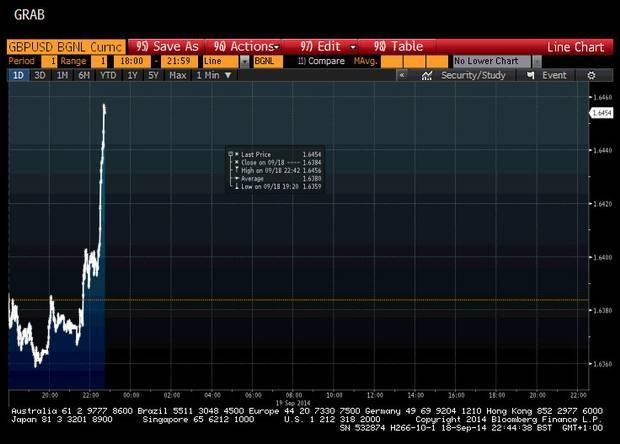
The markets weren't bluffing. Things have picked up pretty swiftly overnight (actually, it looked as though they'd begun recovering yesterday). We've been inundated with whatever the morning-time version of a blitzkrieg of figures is, so take a deep breath...
RBS shares are up 3.3% on a 'No' vote, and the bank has issued a statement saying:
"The announcement we made about moving our registered head office to England was part of a contingency plan to ensure certainty and stability for our customers, staff and shareholders should there be a 'Yes' vote. That contingency plan is no longer required. Following the result it is business as usual for all our customers across the UK and RBS."
Standard Life's shares open up 1.8% and welcomed the news with the following statement:
We fully respect the decision of the Scottish people.
We recognise that further constitutional change is very likely following the clear result of the referendum. We will consider the implications of any changes for our customers and other stakeholders in our business to ensure their interests are represented and protected. As a large company based in Scotland, Standard Life is ready to contribute to this process.
It is now important that we all move forward with respect and work together constructively in the best interests of Scotland and the United Kingdom. Standard Life is a successful global company – we are proud of our Scottish heritage and will continue to build our success from these roots.
Lloyds' shares are up 2.1%, Scottish and Southern Energy's shares have jumped 3%, Aberdeen Asset Management jumps 1.2% and shares of firms with large exposure to the North Sea oil industry - the likes of Weir, Enquest, Petrofect, opened between 2% and 3% higher.
And as the picture above shows, Asian markets reacted strongly even before the final verdict was clear.
08:05: Our Political Editor Nick Assinder has been writing about the massive task faced by both David Cameron and Ed Miliband, despite a 'No' vote.
Says Nick:
David Cameron and Ed Miliband may have escaped the threats to their own leaderships which would have followed a "yes" vote, but their much-criticised campaigning, marked by initial complacency quickly followed by panic, has left them both weakened.
There must, therefore, be the possibility that the size of the victory for the unionists will encourage Westminster to back away from the more radical option of creating a federal United Kingdom and see the planned constitutional rebalancing abandoned or kicked into the very long grass.
And, while politicians in the other nations and regions may demand more power, there is precious little evidence to suggest their voters agree with them.
Previous attempts to create regional assemblies were roundly rejected and there has been very little enthusiasm for elected local mayors.
And while the immediate aftermath of the referendum will see the constitution dominating the political debate, it is worth remembering that politics has a tendency to move on with astonishing speed.
Today's history-making event can very quickly become next week's history.
07:48:

Everyone speculating as to who the biggest winner from the 'No' vote is. Is it Alistair Darling? David Cameron? Nigel Farage? Berwick Rangers?
No, sillies. It's that guy who put £900,000 in total on a 'No' vote in South London! William Hill bookies have been in touch to let us know that he's planning to collect a whopping £1,093,333.33, after placing a succession of bets on the Better Together campaign.
Here's what William Hill has to say:
The man placed four bets in total - of £400,000; two of £200,000 and a fourth, of £100,000 - in the same South West London betting shop.
Another Hill's customer placed what was previously the biggest political bet ever of £200,000 in a Glasgow betting shop and will collect £236,666.
'The Referendum has broken all political betting records' said Hill's spokesman Graham Sharpe. 'We took £3million on the outcome and the industry some £10million - this is more than the last General Election and US Presidential Elections combined, and the equivalent of the amount of money gambled on a high profile televised Premier League match.'
William Hill had always made NO their odds-on favourite, with the odds fluctuating from as short as 1/12 to as long as 2/5. Overnight they remained fairly steady at 1/6, with YES at 4/1 - having also varied during the campaign from as long as 6/1 to as short as 7/4 without ever becoming favourite. 'It is ninteresting that we never wavered from our position of making NO odds-on favourite even when the pollsters were inaccurately suggesting a YES win or a photo-finish' added Sharpe.
07:37: More analysis here on what the 'No' vote and impending devolution, this in a note from Samuel Tombs of research firm Capital Economics.
Understandably, UK markets have already greeted Scotland's decision to remain part of the UK with some relief. Even so, a substantial rally in asset prices seems unlikely, since the markets only ever priced in a small chance of a Scottish Yes vote. Although sterling fell against the dollar in the weeks before the vote, this seems to have largely reflected upward revisions to expectations for US interest rates, rather than concerns the UK might fall apart. So sterling seems unlikely to return to the $1.70 mark seen two months ago.
Meanwhile, Scotland's economy, which the regional PMIs show has consistently underperformed the rest of the UK over the last year, seems set for a period of outperformance as activity and investment that was postponed due to uncertainty about Scotland's future is undertaken. (See Chart 1.)
The rest of the UK is likely to be better off too as a result of stronger growth north of the border. And with thenear-term outlook for the whole of the UK economy a little clearer, the chances that the MPC presses ahead with raising interest rates in the first half of next year appear to have increased.
Nonetheless, the UK economy still seems likely to be weighed down by further bouts of political uncertainty over the next couple of years. For a start, since a Scottish 'No' vote was only achieved at the expense of all three major UK parties committing to the further devolution of powers to Scotland, other regions of the UK may now intensify their demands for more autonomy.
So while the economy's near-term outlook has brightened as a result of the 'No' vote, uncertainty about the political outlook may continue to weigh on firms' investment decisions in the UK and may mean that the relief rally seen in the markets today is short-lived.
07:15: David Cameron has spoken on Scottish Referendum
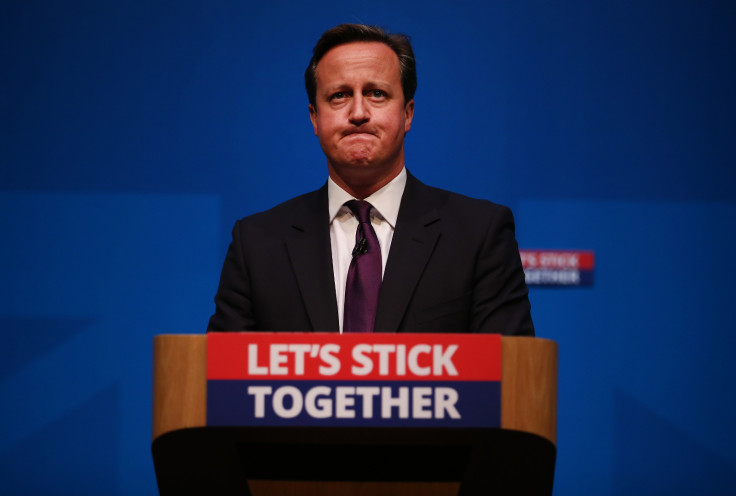
Here are the key points from Prime Minister David Cameron's Downing Street address:
- Promises to deliver on the constitutional reform in Scotland pledged before the referendum
- Also pledges to reform constitutional parliaments in the rest of the UK
- Lord Smith of Kelvin will oversee the devolution commitments on spending, tax and welfare, to be agreed by November and signed into effect in the new year
- West Lothian Question to be addressed in tandem: Cameron says only English MPs will be able to vote on English issues, implies same for Wales and Northern Ireland
- "The people of England, Wales and Northern Ireland must have a bigger say" over their parliaments
- Calls for "a new and fair settlement that applies to all parties"
- William Hague to put plans in place, with a Cabinet Committee to be formed to discuss.
07:05: Some early news on how the markets have reacted to the referendum results from Shane Croucher, Senior Reporter:
The UK's financial markets are set to breathe a sigh of relief after voters in Scotland rejected independence.
A day's optimistic trading as the referendum voting took place was sparked by the final polls suggesting the 'No' campaign was about to win, a gamble that has paid off.
Overnight as the results came through, sterling rallied against the US dollar and yen, while the FTSE100 is expected to open up 1.2% - and could hit new highs throughout the day.
Gains are expected to be made in the share prices of some of Scotland's biggest companies, including the Royal Bank of Scotland and Standard Life, after days of concern and preparations for a break-up of the UK.
Martin Gilbert, chief executive of Aberdeen Asset Management, told Reuters the UK markets will welcome a reduction in the uncertainty of recent months.
Markets and firms were concerned about a number of unresolved economic questions surrounding independence, such as what currency Scotland would use and whether it could join the EU.
06.54: Here are some comments from our Political Editor Nick Assinder, after the people of Scotland vote 'no':
This looks like the end of Alex Salmond's dreams of independence. With Glasgow failing to give the yes campaign a big enough vote to outweigh the no votes already counted the Union will remain.
The Westminster party leaders will breathe a huge sigh of relief this morning. But they still have a huge task ahead in dealing with all the big constitutional questions raised by the extraordinary campaign, not he least delivering on the so-called "home rule vow".
Plenty of speculation that Nicola Sturgeon, for 10 years Alex Salmond's loyal and able deputy, will step up to lead the SNP after what's been a demoralising defeat. But the party will be expected to hold firm over demands on devolution-max. More on what that mean shortly.
06:50: Speaking on BBC, John Reid, the Labour MP, praises Nicola Sturgeon and Alex Salmond for showing graciousness in defeat and calls for Scotland to work together.
06:48 Alistair Darling is now addressing a crowd
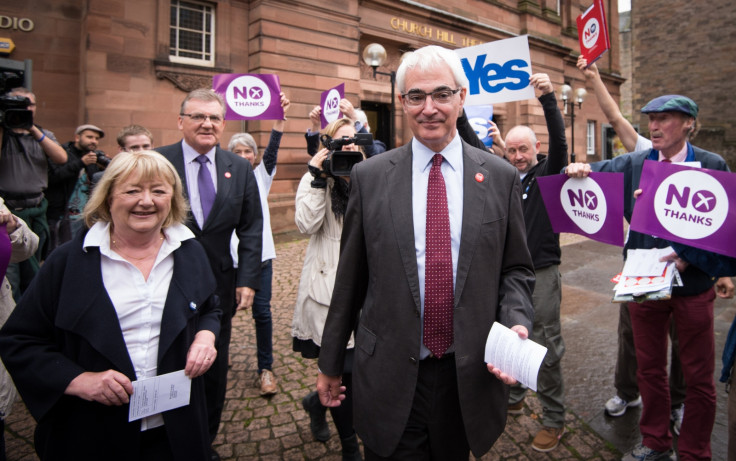
Leader of the Better Together campaign acknowledged a hard fought campaign, here are some of his quotes:
"Let the bonds that tie us together never be broken. But as we celebrate, let us also listen. More than 85 percent of the Scottish electorate have voted, the people who were disenchanted have voted in large numbers. Every political party must now listen to the cry for change."
Thanked all the staff and volunteers.
"We've taken on the argument and we've won.
"I understand that amongst those who supported yes there will be disappointment or even grief. There are many people who must continue to make their contribution to the political debate in our country.
"All of the parties who have made shared commitment to change must now start turning that commitment into reality.
"Come on Scotland, let's get on with it together.
06:42: Alex Salmond has spoken in Edinburgh
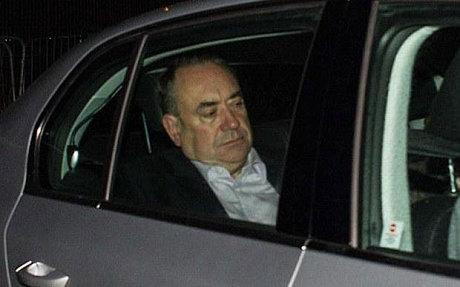
Thank you for that reception and above all thank you to Scotland for 1.6 million votes for Scottish independence.
Our friends in the Highlands are still to speak, but we know there is going to be a majority for the no campaign. It's important to say that our referendum has been a brave and consented process.
I accept that verdict of the people and call of all of Scotland to follow suit, and accept the democratic verdict of the people of Scotland.
That 55 percent, that 1.6 million votes, is a substantial vote for Scottish independence and the future of this country.
I think the process by which we have made our decision as a nation reflects enormous credit on Scotland. The turnout is one of the highest for any election in history.
The initiative by which 16 and 16-17 year olds were able to vote has been a resounding success. No-one again will dispute their right to vote responsibly in democratic elections.
We now face the consequences of Scotland's decision. Firstly, clause 30 of the Edinburgh agreement is now in operation. I accept the result and pledge to work constructively in the interest of the United Kingdom.
Just as a reminder, we have been promised a second reading of the Scotland bill by 20 march next year. All scots will demand that that timetable is followed.
Can I return to the empowerment of so many scots entering the political process for the first time. It's something so powerful, it has to be cherished, preserved, and built upon. The most moving thing I saw was the queue of people in Dundee registering to vote, most of them for the first time ever.
We have touched sections of the community that have never before been touched by politics. That will never be allowed to go back to business as usual in politics again.
As we bring Scotland together, let's not dwell on the distance we have fallen short, let's dwell on the distance we have travelled. We shall go forward as one nation.
© Copyright IBTimes 2025. All rights reserved.






















